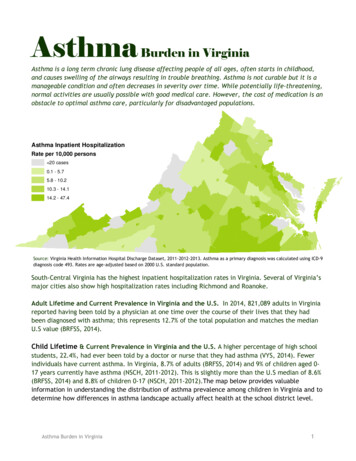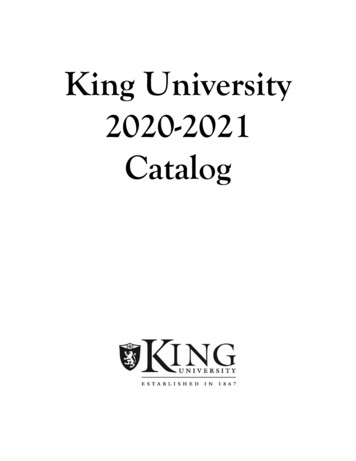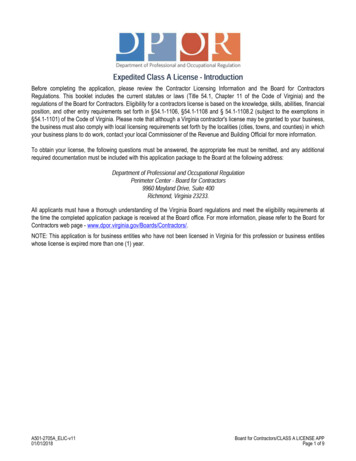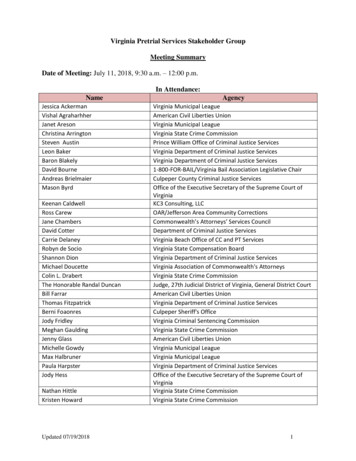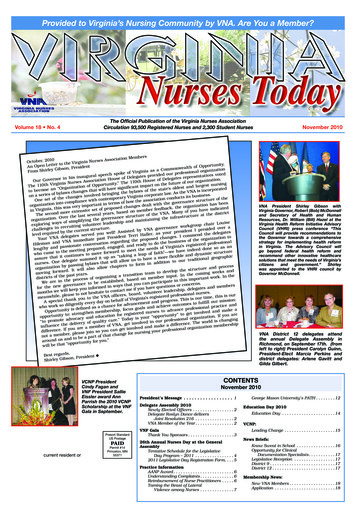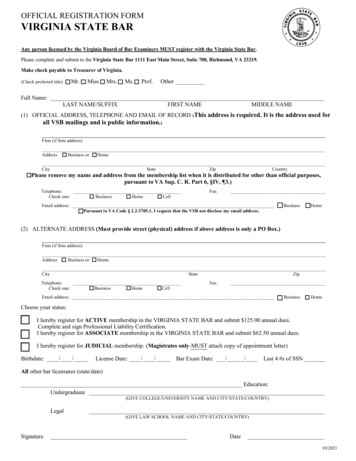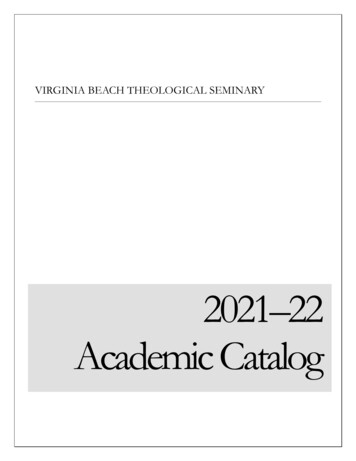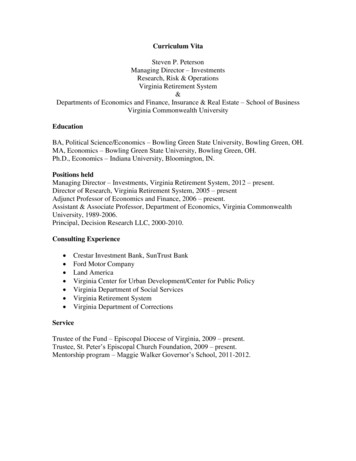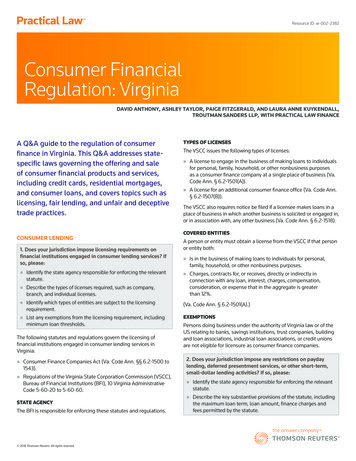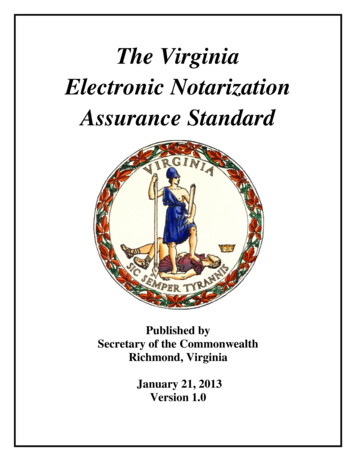
Transcription
The VirginiaElectronic NotarizationAssurance StandardPublished bySecretary of the CommonwealthRichmond, VirginiaJanuary 21, 2013Version 1.0
Table of ContentsScope and Intent. 1Definitions . 3Article 1: Electronic Notarization Generally . 41.1Registration . 41.2Basic Performance Requirements for the Electronic Notarial Act . 41.3Electronic Record of Notarial Acts . 41.4Lawful Inspection of the Electronic Record of Notarial Acts . 5Article 2: Official Electronic Signature and Seal Requirements . 52.1Official Electronic Signature and Seal . 52.2Protected Access to the Official Electronic Signature and Seal. 62.3Electronic Notarization Sytems . 62.4Non-Notarial Use Prohibition . 7Article 3: Online Notarization . 73.1Validity of Digital Certificate(s) . 73.2Identity Proofing by Digital Certificate or PIV Card . 73.3 Antecedent Identity Proofing Process . . . 73.4Standards for Secure Transmissions for Electronic Video and Audio Communications . 7Article 4: Notarized Electronic Document Requirements . 74.1Capability for Verifying the Notary’s Electronic Signature and Seal . 74.2Capability for Testing Authenticity of the Electronic Notarial Certificate . 8
1Scope and Intent234567The challenges before notaries in the Commonwealth of Virginia, throughout the United States,and around the world are to preserve and strengthen the role of the notary in the rapidlyemerging digital economy and to ensure reliability and cross-border recognition of notarizedelectronic documents in a global economy. Consequently, notaries in the Commonwealth ofVirginia should transition to performing electronic notarizations that have the same legal effectand admissibility as currently presumed by their physical-world counterparts.8910The validity and enforceability of an electronically notarized document rests upon confirming thelegitimacy of the notary who signed the record and establishing the integrity of the signed recorditself. 1112131415161718In recent years, distinguished notarial experts from the United States and around the world havestudied electronic notarization systems. A consistent message has been that a digital certificate ina public key infrastructure is the technology best suited today to achieve these aims.19202122232425262728To fulfill the requirements of Virginia Code §47.1-6.1, and in an effort to standardize theprocesses and procedures for performing electronic notarization, including the issuance of digitalcertificates used by Virginia electronic notaries, the Secretary of the Commonwealth of Virginiahas looked to standards previously promulgated by the National Association of Secretaries ofState, Arizona, Colorado, Florida, Kansas, New Mexico, North Carolina, Pennsylvania, andNotary Societies from Common Law and Civil Law jurisdictions to develop the VirginiaElectronic Notarization Assurance Standard (the “Virginia Standard”). The goal of this VirginiaStandard is to achieve recognition of Virginia electronic notary signatures and seals as well aselectronic notarization systems that would facilitate acceptance of Virginia electronic notarialacts worldwide.29Influences on the Virginia Standard Legitimacy involves verifying the identity of the electronic notary who created theelectronic signature and the electronic notary’s official status.Integrity involves corroborating that the presented record accurately reflects the data andform of the record originally electronically signed by the electronic notary.3031A. The Virginia Standard Reflects the National Association of Secretaries of State (USA)Electronic Notarization Standard for Document Security3233343536The National Association of Secretaries of State has established performance expectations forelectronic notary signatures and seals and their use. Consistent with paragraphs 5 and 7 of theElectronic Notarization Standards of the National Association Secretaries of State, the VirginiaStandard specifies how the electronic notary must maintain exclusive control over the electronicsignature and seal. In addition, the requirement in the Virginia Code that the electronically1
1234567notarized document be rendered tamper evident is consistent with paragraph 5 of the NationalAssociation of Secretaries of State Electronic Notarization Standards. This paragraph specifiesthat “[w]hen performing an electronic notarization, a notary public shall apply an electronicsignature, which shall be attached to or logically associated with the electronic document suchthat removal or alteration of such electronic signature is detectable and will render evidence ofalteration of the document containing the notary certificate which may invalidate the electronicnotarial act.”89B. The Virginia Standard Reflects Previously State-Issued Electronic NotarizationStandards in the United States101112131415The Virginia Standard relies on previously well-considered e-notarization standards issued byArizona, Colorado, Florida, Kansas, New Mexico, North Carolina, and Pennsylvania. Inparticular, the Virginia Standard borrows the concept of an Electronic Notarization System fromArizona, Colorado, Florida, and North Carolina. In addition, the Virginia Standard borrows fromArizona, Florida, Kansas, New Mexico, and Pennsylvania the best practice of reliance on digitalcertificates that are securely issued and managed by a trusted root Certificate Authority.1617C. The Virginia Standard is Consistent with Existing Electronic Signature Laws andStandards181920212223This standard reflects the requirements of the following authoritative electronic signaturesources:(a) the United States Electronic Signatures in Global and National Commerce Act (“ESIGN”),1(b) the Uniform Electronic Transactions Act,2 and(c) the Uniform Real Property Electronic Recording Act.32425262728293031The challenge facing the global move toward electronic notarization is establishing a legallyreliable approach for performing and evidencing the electronic notarial act and managingnotaries’ electronic signatures and seals. Without a Virginia Standard that is aligned to thevarious national signature laws and emerging industry access control and secure messagingrequirements, notaries could face the need to have access to multiple electronic signingcredentials and systems. At the same time, every relying party should know that the electronicsignature and seal of the Virginia electronic notary are as legally valid and reliable as theelectronic signature and seal of a notary in any other jurisdiction.115 U.S.C.A. §§ 7001 et seq.UNIF. ELEC. TRANSACTIONS ACT (Nat’l Conf. of Comm’rs on Unif. State Laws, 1999) enacted in Virginia at VA.CODE ANN. § 59.1-479 et seq.3UNIF. REAL PROPERTY ELEC. RECORDING ACT (Nat’l Conf. of Comm’rs on Unif. State Laws, 2004), enacted inVirginia at VA. CODE ANN. § 55-142.10 et seq.22
0313233343536373839Definitions(a) “Accessed by biometric data” means proving the identity of a user by requiringverification of the user’s identity through technologies that require measurement andanalysis of one or more human physiological or behavioral characteristics of the user inorder to access and use a digital certificate. Biometric data includes fingerprint scanning,retinal scanning, hand geometry, voice recognition, and handwriting analysis.(b) “Appear or appears in person” means either in the same physical location or by two-waylive video and audio conference communication.(c) “Attach” means the electronic notary’s electronic signature and seal are securely bound tothe electronic document in such a manner as to make it impracticable to falsify or alter,without detection, either the signature or the document.(d) “Capable of independent verification” means that any interested person may confirm thevalidity of an electronic notarial act, including the electronic signature and seal, through apublicly accessible system and in compliance with the X.509 digital certificate standard.(e) “Digital certificate” means a computer-based record or electronic file issued to anelectronic notary for the purpose of creating an official electronic signature inconformance with this Standard.(f) “Electronic document” means any electronic record or file that can be signed with adigital certificate or an electronic notarization system.(g) “Electronic notarization system” means a set of applications, programs, hardware,software, or technology designed to enable an electronic notary to perform electronicnotarizations, including online notarizations, in the manner of a security procedure as thatterm is defined below and in the Uniform Electronic Transactions Act (Virginia Code§59.1-479 et seq).(h) “Exclusive control” means accessible by and attributable solely to the electronic notary tothe exclusion of all other persons and entities, either through being in the direct physicalcustody of the electronic notary or through being secured with one or more biometric,password, token, or other authentication technologies in an electronic notarization systemthat meets the performance requirements of Virginia Code §47.1-14 and §47.1-16.(i) “Online notarization or online notarial act” means the performance of an electronicnotarial act by means of two-way live audio and video conference technology that meetsthe performance requirements of Virginia Code §47.1-2 and §19.2-3.1 B1, B2, and B3.(j) “Security procedure” means a procedure employed for the purpose of verifying that anelectronic signature, document, or performance is that of a specific person or fordetecting changes or errors in the information in an electronic document. The termincludes a procedure that requires the use of algorithms or other codes, identifying wordsor numbers, encryption, or callback, or other acknowledgment procedures.(k) “Signing key” means the private cryptographic key of a digital certificate.(l) “Standard” means the Virginia Electronic Notarization Assurance Standard.3
1Article 1: Electronic Notarization Generally21.1345678910111213141516Registration(a) Before performing any electronic notarial acts, a notary shall register the capability tonotarize electronically, including the means for completing online notarizations. TheSecretary shall develop a form to be submitted by each notary for this purpose. The formmust be resubmitted upon renewal of the electronic notary commission.(b) Upon successful completion of all registration requirements, the Secretary of theCommonwealth shall email to the notary’s email address on file an approval letter thatconfirms the commission to act as an electronic notary.(c) The Secretary of the Commonwealth will not render an opinion or determination as towhether a particular electronic notarization system or technology used by a notary is incompliance with this Standard or the Code of Virginia. Responsibility for compliance issolely on the electronic notary.1.2 Basic Performance Requirements for the Electronic Notarial Act1718192021222324(a) In performing electronic notarial acts, an electronic notary shall continue to adhere to allrules governing paper-based notarial acts, except that notaries performing online notarialacts can allow signers to appear before the electronic notary via two-way live video andaudio conference, consistent with Virginia Code §47.1-2 and §19.2-3.1 B1, B2, and B3.25262728293031(c) A notary shall not use a digital certificate as the electronic notary’s official electronicsignature and seal if that digital certificate has expired or been revoked.(b) An electronic notary shall not perform an electronic notarization if the document signerdoes not appear before the electronic notary at the time of the notarization either in thesame physical location or by means of two-way live video and audio conference.(d) The official electronic signature and seal of the electronic notary shall be used to digitallysign the electronic document in such a manner that relying parties can detectunauthorized tampering or alteration of the electronic document after it has been digitallysigned by the electronic notary.321.3 Electronic Record of Notarial Acts33In accordance with Virginia Code §47.1-14, an electronic record of notarial acts shall:4
123(a) Allow record entries to be made, viewed, printed out, and copied by an electronic notaryonly after access is obtained by at least one factor of authentication such as a password,biometric verification, token, or other form of authentication.456(b) Not allow a record entry to be deleted or altered in content or sequence by the electronicnotary or any other person after a record of the electronic notarization is entered andstored.78(c) Have a backup system in place to provide a duplicate electronic record of notarial acts asa precaution in the event of loss of the original record.91011121314151617181920212223(d) When not in use, the electronic record shall be kept under the exclusive control of theelectronic notary, and shall not be used by any other electronic notary nor surrendered toan employer upon termination of employment. The electronic record is at all times theexclusive property of the notary and no employer or vendor of e-notary services mayretain control of a notary’s electronic record for any reason. Exclusive control isachieved by ensuring that at least one method of authentication is required to verify theidentity of the electronic notary requesting access to the electronic record.1.4 Lawful Inspection of the Electronic Record of Notarial ActsTo fulfill the requirements of Virginia Code §47.1-14 C, the electronic notary shall respond to alawful, written request to inspect an electronic notary’s record by producing a certified copy ofthe electronic record that includes an entry in the electronic notary’s record documenting thecertified copy production. Copy certification is an authorized notarial act pursuant to VirginiaCode §47.1-12.24Article 2: Official Electronic Signature and Seal Requirements252.1 Official Electronic Signature and Seal26272829303132333435(a) In accordance with the requirements of Virginia Code §47.1-14 E and §47.1-16 B and D,the means by which an electronic notary creates an official electronic notary signatureand seal shall be:(i) attributed or uniquely linked to the electronic notary;(ii) capable of independent verification;(iii)created using means that the notary can maintain under the electronic notary’sexclusive control; and(iv) linked to the electronic document to which it relates in such a manner that anysubsequent change of the electronic document is detectable.5
12345678910(b) In fulfillment of the requirements of Virginia Code §47.1-16, an electronic notary shalluse a digital certificate to digitally sign electronic documents requiring notarization.The notary’s official signature and seal consist of both the digital signature and animage or text on the electronic document that includes the following information:(i) the electronic notary’s name (as shown on the notary’s electronic notarycommission);(ii) the electronic notary’s registration or commission number;(iii)the words “Electronic Notary Public”;(iv) the words “Commonwealth of Virginia”; and(v)the electronic notary’s commission expiration date.11121314151617181920(c) The digital certificate, along with the image or text displaying the information in Section2.1(b), must be affixed to the document in such a manner that any subsequentunauthorized modification or alteration of the information can be detected.(d) A digital certificate used by an electronic notary to digitally sign electronic documentsshall conform to X.509 digital certificate standards and be issued and managed by atrusted root Certificate Authority.(e) The digital certificate used by an electronic notary to digitally sign electronic documentsmay not be used beyond the expiration date of the electronic notary’s commission.212.2 Protected Access to the Official Electronic Signature and Seal22232425In fulfillment of Virginia Code §47.1-14 E, access to the means by which an electronic notarycreates an official electronic signature and seal, including through an electronic notarizationsystem, shall be protected by use of at least one factor of authentication such as a password,token, biometric, or other form of authentication.262.3 Electronic Notarization Systems272829303132333435(a) In fulfillment of Virginia Code §47.1-14 E, an electronic notarization system shall, byappropriate technical and procedural means, ensure that the signing key used forgenerating an official electronic signature and seal:(i) is kept reasonably secured such that the signing key remains secret;(ii) cannot, with reasonable assurance, be derived; and(iii)can be reliably protected from misuse.(b) When keyed hardware tokens are used, the delivery shall be accomplished in a way thatensures that the correct token and activation data is provided to the electronic notary.6
12.4 Non-Notarial Use Prohibition2345In accordance with Virginia Code §47.1-14 F, the electronic notary’s registered electronicsignature and seal shall be used together only for the purpose of performing lawful electronicnotarial acts.67Article 3: Online Notarization3.1 Validity of Digital y electronic notarization system used by an electronic notary must ensure that the digitalcertificate used by an electronic notary has not expired or been revoked at the time the digitalcertificate is used to digitally sign an electronic document.26Article 4: Notarized Electronic Document Requirements274.1 Capability for Verifying the Electronic Notary’s Signature and Seal282930313233343536In accordance with Virginia Code §47.1-16, an electronic notarization system must be capable ofproducing an electronically notarized document that allows relying parties to verify the followinginformation regarding the electronic notary’s official electronic signature and seal:(a) the authenticity and validity of the digital certificate used by the electronic notary todigitally sign the document at the time of the notarization may be reliably verified;(b) the electronic notary’s identifying information, including the electronic notary’scommissioned name, registration number, the words “Electronic Notary Public” and“Commonwealth of Virginia,” and the electronic notary’s commission expiration date arecorrectly displayed;3.2 Identity Proofing by Digital Certificate or PIV CardIn the event an electronic notary identifies the signer by means of the signer’s digital certificateor PIV card, the electronic notarization system must ensure for the electronic notary that thedigital certificate or PIV card used by the signer has not expired or been revoked at the time thenotarization is performed.3.3 Antecedent Identity Proofing ProcessThe electronic notary shall only rely on an antecedent in-person proofing process that conformsto the guidelines of the Federal Bridge Certification Authority.3.4 Standards for Secure Transmission for Electronic Video and Audio CommunicationsThe electronic notary shall take reasonable steps to ensure that the use of two-way live video andaudio communication is secure from interception through unlawful means.7
12(c) any changes or alterations to the notarized document subsequent to the electronic notary’saffixation of a digital signature can be reliably detected.34.2 Capability for Testing Authenticity of the Electronic Notarial Certificate4567In accordance with Virginia Code §47.1-16 D, an electronic notarization system must enable theelectronic notary to include an electronic notarial certificate that shall be attached to or logicallyassociated with the electronic document in such a manner that removal or alteration of theelectronic notarial certificate is detectable.8
2 1 notarized document be rendered tamper evident is consistent with paragraph 5 of the National 2 Association of Secretaries of State Electronic Notarization Standards. This paragraph specifies 3 that "[w]hen performing an electronic notarization, a notary public shall apply an electronic 4 signature, which shall be attached to or logically associated with the electronic document such
